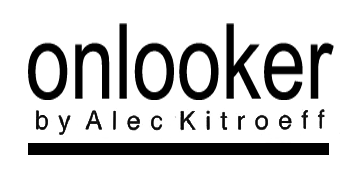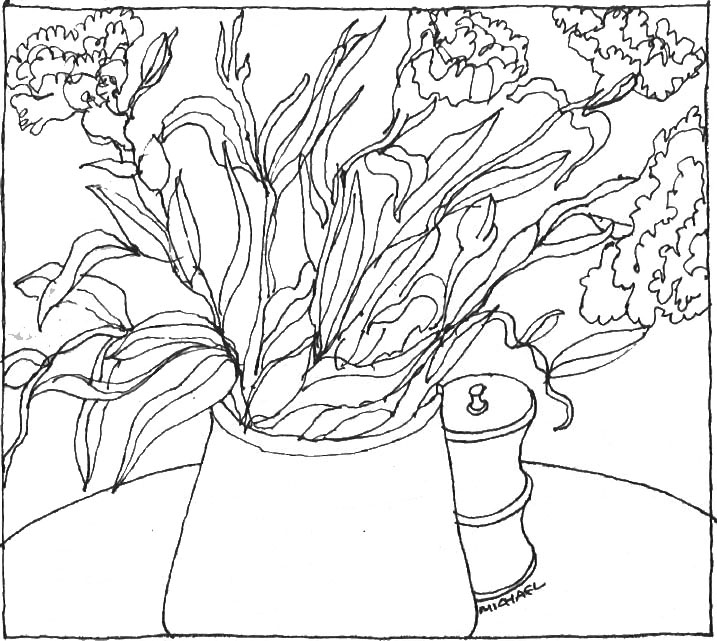
MILTO Polykaravakis, the shipping tycoon, was in a foul mood as he sat in his chauffeur-driven Cadillac on his way to Piraeus. It was pelting rain outside, his ulcers were troubling him again, and he was on his way to preside over a board meeting of one of his companies that was on the brink of bankruptcy.
He rolled down his window half-way to throw out the butt of his Corona Corona cigar just as a heavy truck drove past, spattering the entire left side of the Cadillac with a sheet of muddy water. Milto exploded with an oath and Vassili, the chauffeur, looked back to see his boss mopping his round, red face and bald head with a handkerchief and then trying to wipe muddy stains off his smart, blue-serge blazer. But he only succeeded in spreading the mud over a larger area.

“It’s no good, you’ll have to turn back. I must go home and change. I can’t go to the meeting like this,” Milto said, releasing a torrent of abuse at the tail-lights of the fast-disappearing truck.
“Wait a minute, sir,” Vassili said, “my house is just around the next corner, here, in Moschato. My wife can clean and press your blazer in no time at all, and you can still make the meeting. We can ring up from the house and tell them you’ll only be a few minutes late.”
Milto would have preferred to cancel the meeting and the interiors of lower middle-class homes always depressed him, but Vassili had already turned the corner so he sat back and resigned himself to both these cheerless prospects.
Vassili’s house was a ground-floor apartment in one of those new blocks of flats that spring up almost overnight throughout the Athens-Piraeus area. Milto wrinkled his nose at the smell of drains that assailed him inside the lobby and he shuddered in horror at the plywood shoddiness of Vassili’s front door as the chauffeur turned his key in the lock. As they went in they were met by the astonished gaze of a small boy who was eating a slice of bread with a gooey chocolate spread on it.
The child bolted through a door shouting: “Mama, it’s Baba with a man!” In a few seconds he re-emerged followed by a plumpish young woman in a faded dressing gown and slippers and with curlers in her hair.
Vassili quickly explained Milto’s predicament to his wife who said: “Of course, of course, I’ll clean it up in a jiffy. I’m very pleased to meet you, Mr. Polykaravakis. Vassili has told me so many good things about you. He’s very pleased to be working for you.” And so he should be, Milto thought to himself, considering the salary I’m paying him, and all the social charges and bonuses required by law. But he bared his teeth in an affable grin and removed his blazer.
“Please forgive me for my appearance,” Vassili’s wife twittered on, “I wasn’t expecting you. Please take a seat in here.” She ushered Milto into a stuffy little living room that had dust covers over the furniture and a plastic covering over a gaudy gilt chandelier.
The rain had stopped and the sun was shining outside. She opened a shutter to let in some light and removed the dust cover from an over-stuffed brown velvet armchair. Milto sank down in it and lit another Corona Corona, as Vassili’s wife excused herself to go and clean the blazer. Vassili, meanwhile, had rung up the office to say they would be a little late and went out to clean the mud-bespattered Cadillac.
A little while later the little boy came in holding a small tray with a saucer of wild cherry jam and a glass of iced water. Milto’s ulcers cringed at the sight but he realized that if he did not eat the jam his hostess would be mortally offended. He couldn’t dispose of it in any other way either, because the little boy was standing there, staring at him wide-eyed.
“What is your name?” Milto asked.
“Taki,” the boy said, then added, “I have a ship too.”
“Really?” Milto said with an amused smile.
“Yes,” Taki said, “Do you want to see it?”
“Of course,” Milto said, wincing with pain as the cherry jam came up and said, “hello!” The little boy ran out of the room and Milto quickly popped a couple of digestive tablets into his mouth. Taki returned, holding a rather battered toy in the shape of a passenger ship made of plastic. Milto took it and examined it appraisingly.
“She’s a lovely ship,” he said, “what do you call her?”
“The ‘Assimina’, like yours,” the boy replied.
The ulcers signalled their presence again with a sharp stab. His “Assimina”, named after his redoubtable mother (who, it was said, had worn out his father and sent him to an early grave as a result of her insatiable sexual appetite), was a twenty-millon dollar cruise ship that appeared to be doing the same thing to his passenger ship company — draining it of all its financial resources.
Although she did well on Aegean cruises in the summer, her profits were barely enough to cover the interest on the bank loans Milto had contracted in order to build her. Two attempts to increase her earnings with winter cruises in the Caribbean and in the Western Mediterranean had ended disastrously. In the Caribbean, she damaged her propellers on a sunken log and had to be towed to Havana. Her five hundred passengers had to be flown back to Miami and their fares refunded while subsequent cruises were cancelled. In the Western Mediterranean, the fresh water she took on in Tangier was contaminated and she had to disembark all her passengers at Marseilles with acute diarrhoea and litigious dispositions.
The banks were now threatening to foreclose on their mortgages. His shipping company’s coffers were empty and his tanker and dry cargo ship companies were barely holding their heads above water, with three-quarters of their ships laid up as a result of the crippling crisis in the freight market. The meeting he was going to was to decide the fate of the “Assimina” — if no useful and profitable employment could be found for her this coming winter, his passenger ship company would go bankrupt.
Milto suddenly realised the child was trying to say something to him. “I ‘m sorry,” he said, “what did you say?”
“Come with me to the empty lot behind the house and I’ll show you how my ‘Assimina’ sails on the water.”
Milto rose from his armchair. Anything was better than this depressing sitting room. He followed Taki through the kitchen door and out on to the empty lot where the rain had formed a small pond. Taki knelt down and pushed his plastic toy along the muddy water, making a noise like a ship’s siren.
“And where is the ‘Assimina’ going?” Milto asked.
“To Africa,” Taki said. “Do you see that forest over there?” The forest was a clump of tall weeds growing at the edge of the pond. “There are lions and tigers in there and the Captain is going to shoot them.”
Milto was just about to point out to Taki that there were no tigers in Africa and that people didn’t shoot wild animals any more because there were so few of them left when he was interrupted by Vassili’s wife who came out with his blazer in her hand — beautifully cleaned and pressed. He thanked her profusely, patted Taki on the head, and told him he must leave him now. A few seconds later he was on his way to Piraeus again, in his freshly-washed Cadillac.
“I hope Taki didn’t annoy you too much,” Vassili said.
“Not at all, he’s a charming little boy,” Milto replied affably. “He has a very vivid imagination. He sails the ‘Assimina’ to Africa.”
Vassili chuckled and said: “Yes, that toy keeps him amused for hours on end. Africa indeed!”
Then the idea came to Milto. “Indeed, why not?” he thought to himself. A three-week winter cruise from Piraeus to Mombasa and back. The passengers could be disembarked at Port Said for a trip to Cairo to see the Pyramids and rejoin the ship at Suez, then a few days on safari in Kenya — Treetops Hotel and all that — December to March was the dry season. Perfect. Three or perhaps four such voyages could be scheduled before the Aegean cruises were due to begin. It could be the ideal solution to the “Assimina” problem.
Milto rubbed his hands gleefully at the thought of the surprise he would spring at the board meeting. In any case, he thought, he could overrule any objections simply because he was a majority shareholder in the company.
On December 20, the “Assimina” sailed on her first ‘Safari Cruise’ with a full complement of passengers and on Christmas morning little Taki woke up at the crack of dawn and rushed into the hall to open his presents under the gaily-decorated tree. Dominating them all was a huge wooden box, tied with a broad red ribbon. When he took the lid off the box he found himself staring wide-eyed at a beautiful scale model of the “Assimina”, like the ones displayed in the windows of travel offices. His shrieks of delight brought his parents from the bedroom and they stood in their dressing gowns, staring bleary-eyed at the wonderful present Taki had received.
Then Vassili stooped and picked up an envelope from the box. It contained a card and free tickets for Taki and his parents on the next ‘Safari Cruise’ scheduled for mid-January. Vassili read out the writing on the card: “To Taki and his parents, with very many thanks and best wishes for Christmas and the New Year.” It was signed by Milto Polykaravakis.
It was Taki’s mother’s turn to shriek with delight at this totally unexpected gift. Then she said: “If I ‘d known he was going to be so appreciative for cleaning his blazer I ‘d have offered to iron his pants and shirt as well!”







